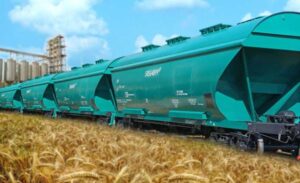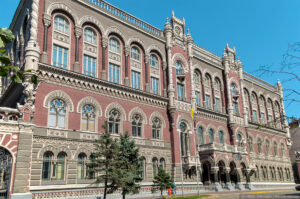
Artem Shevchenko, CEO of the monomarket marketplace, has left the company.
He announced this on his Facebook page.
“A journey lasting almost three years is coming to an end. It has been an extraordinary journey — from an idea to a working project that has been able to generate hundreds of millions of hryvnia in turnover every month. From three people at the start to a team of 130+ professionals today. Monomarket has become an integral part of the Ukrainian e-commerce market and has significantly changed its landscape. And this project still has many achievements ahead,“ he wrote.
The top manager thanked the team, founders, and partners and stated that his stage in the project was complete. ”I’m moving on. Another large e-commerce project has been built. Let’s move on to the next one,” Shevchenko wrote.
As reported, monobank launched a marketplace in its mobile app in October 2024.

The growth rate of housing construction costs in Ukraine in 2026 will slow down slightly compared to previous periods, with an average increase of 10–15% over the year, according to Ukrainian developers.
“In 2026, we expect further growth in construction costs, but the pace of this growth is likely to be more moderate than in previous periods. The main factors remain the cost of construction materials, energy, logistics, and labor, as well as currency fluctuations,” the press service of the DIM group of companies told Interfax-Ukraine.
Containing the growth of construction costs is possible thanks to the adaptation of the construction market to new conditions: optimization of design solutions, construction processes, and supply chains. At the same time, maintaining a balance between the economic efficiency of projects and the preservation of housing standards remains an important condition, the company noted.
At the same time, pressure on costs next year will come from the cost of energy, logistics, import-dependent building materials, as well as stricter requirements for engineering systems and safety, said Perfect Group project manager Oleksiy Koval. According to him, the company expects costs to grow by 15-20% in 2026.
“Our baseline scenario is a 15-20% year-on-year increase in production costs, but the range will depend on the exchange rate, material prices, and the situation on the labor market. We are building in a safety margin through longer contracts with contractors, optimising project solutions without compromising quality, and planning purchases of critical materials in advance,” he said.
Wages in the industry remain an important factor in the growth of construction costs, Koval added. To combat the labor shortage, Perfect Group is working on employment contracts with foreigners, particularly from India, to attract them to contract work.
In turn, Dan Saltsov, commercial director of Greenville’s Kyiv projects, predicts a moderate increase in the cost of housing construction within the range of 6-12% per year.
“It is likely that the cost will continue to grow by 6-12% per year. Trends in recent years confirm an annual increase. The main factors influencing this are inflation, rising prices for construction materials, higher wages, labor shortages, and currency fluctuations. The market is undergoing structural changes,” said the expert, adding that a decline in housing prices is not to be expected.
This is also confirmed by experts from the developer RIEL. As the company told Interfax-Ukraine, in addition to rising costs, the price per square meter will also be affected by the rising cost of loans in the construction sector.
“We predict further price increases due to rising costs, growth in investments that developers make at the start of a project, and the rising cost of loans in the construction sector. However, in our opinion, demand will remain stable, although a significant increase in new construction should not be expected,” the developer said.
According to the forecast of the construction company Intergal-Bud, the cost of housing will continue to grow within the range of 10-15% compared to 2025.
“The cost per square meter is likely to continue to grow, but without sharp jumps, within the range of 10-15%, and will have objective reasons related to the rise in the cost of construction materials, engineering solutions, labor shortages, as well as security, military, and political factors,” said Olena Ryzhova, commercial director of Intergal-Bud.
According to her, the primary residential real estate market will maintain cautious positive dynamics in 2026. Thus, demand for housing in the “comfort” and “business” segments will remain stable, as will the purchase of apartments in the early stages of construction, traditionally one of the most reliable assets for preserving funds.
However, the residential construction market has not yet recovered to its pre-war levels, the Kovalskaya Group emphasizes. According to the developer, construction costs will continue to rise in response to the rising cost of building materials and energy, as well as due to a reduction in new projects.
“Given the realities we are seeing, the construction market has not yet recovered to pre-war levels. Developers are mainly completing previously started projects, with only one new project for every five completed. The rise in the cost of construction materials and electricity, as well as the reduction in supply, will lead to an increase in the cost of construction. The sale price of apartments is expected to grow by 10-15% per year in currency terms,” the company notes.
As reported with reference to data from Ukrainian developers, the cost of housing construction in Ukraine in the first nine months of 2025 grew by an average of 10-25%, depending on the class of housing. According to the State Statistics Service, prices for construction and installation works in the third quarter of 2025 increased by 5.3% compared to the same period last year, while prices in the primary housing market increased by 12.8% during the same period.

In January 2026, Ukrzaliznytsia will raise prices for most types of rolling stock, with only the cost of transportation by grain carriers and container platforms remaining unchanged, corresponding to the December rates of UAH 1,250/day and UAH 203/day (excluding VAT), respectively.
According to the tariffs published on the company’s website, in January 2026, compared to December 2025, the cost of tank cars for transporting food products will increase from UAH 738/day to UAH 938/day (excluding VAT), mineral carriers – from 203 UAH/day to 450 UAH/day (excluding VAT), and semi-cars – from 1350 UAH/day to 1450 UAH/day (excluding VAT).
Ballast and cement tankers will increase in price by 100 UAH/day, to 703 UAH/day and 1,300 UAH/day (excluding VAT), respectively.
The cost of fitting platforms will also change: 40-foot platforms will increase from 750 UAH/day to 900 UAH/day (excluding VAT), 60-foot platforms — from 850 to 900 UAH/day, and 80-foot platforms will increase from 1250 to 1450 UAH/day (excluding VAT).
The cost of tanks for transporting liquefied gas will increase by 400 UAH to 603 UAH/day (excluding VAT) in January.
Only flatbed timber trucks will become cheaper by 200 UAH, to 1360 UAH/day (excluding VAT).

Ukrzaliznytsia has equipped 100 of its own railcars as temporary mobile heating, communication, and leisure centers in response to power outages across the country, the company said in a statement on Tuesday.
“Ukrzaliznytsia, with the help of its partners—All Hands&Hearts, World Central Kitchen, Hachiko Foundation, and White Stork—has equipped 100 of its railcars as temporary mobile heating, communication, and leisure centers,” the company said in a statement on its Telegram channel.
It is noted that the railcars have a full heating system. In addition, they are equipped with chargers from generators and portable power sources, microwaves, refrigerators, and Starlink kits for uninterrupted communication.
Ukrzaliznytsia added that each of the 100 carriages can be used at the request of local authorities as a free mobile hub with a constant autonomous power supply.
Separately, the company noted that the cars have a children’s compartment equipped with play sets, as well as a compartment for a comfortable stay with pets.

The National Bank of Ukraine (NBU) has imposed sanctions on Paytek LLC (Kyiv) for violating the requirements of the legislation regulating activities in the payment market: it imposed a fine of UAH 12,803,900 and issued a written warning. According to information on the NBU website, the fine was imposed for violating the requirements of the law on the provision of payment services and the rules for storing and protecting the confidentiality of payment service providers.
It is noted that the inspection department conducted a scheduled inspection of Peitek LLC in May-July 2025, and the company had to pay the fine within 14 calendar days from the date of receipt of the relevant decision.
Peitek LLC is also obliged to eliminate the violations and prevent them in the future until February 27, 2026.
According to data from YouControl, Peitek LLC was registered in Kyiv in 2021. Its authorized capital is UAH 5.5 million. It is owned by Aldega CJSC (Lithuania) Andrius Trofimovas, who is the owner of the microcredit company Aventus Ukraine LLC.
According to the company’s website, Peitek LLC provides services for transferring funds in national currency without opening accounts, as well as for providing funds and bank metals on credit, while, as noted, it does not provide loans to individuals who are consumers of financial services and does not settle their overdue debts.
The full list of recipients of funds to whom Paytec LLC makes transfers and with whom it has concluded relevant agreements includes the following microcredit companies: Aventus Ukraine LLC (CreditPlus TM), Lineura Ukraine LLC (Credit 7 TM), Selfie Credit LLC (SelfieCredit TM), Slon Credit LLC, Innovation Company LLC, Star Finance Group LLC (StarFin and Suncredit TM), FC Procent LLC, KLT Credit LLC, and Gama Upgrade LLC.